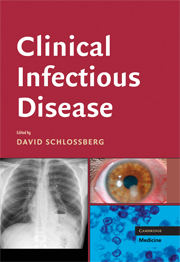Book contents
- Frontmatter
- Contents
- Preface
- Contributors
- Part I Clinical Syndromes – General
- Part II Clinical Syndromes – Head and Neck
- Part III Clinical Syndromes – Eye
- Part IV Clinical Syndromes – Skin and Lymph Nodes
- Part V Clinical Syndromes – Respiratory Tract
- Part VI Clinical Syndromes – Heart and Blood Vessels
- Part VII Clinical Syndromes – Gastrointestinal Tract, Liver, and Abdomen
- Part VIII Clinical Syndromes – Genitourinary Tract
- Part IX Clinical Syndromes – Musculoskeletal System
- Part X Clinical Syndromes – Neurologic System
- Part XI The Susceptible Host
- Part XII HIV
- Part XIII Nosocomial Infection
- Part XIV Infections Related to Surgery and Trauma
- Part XV Prevention of Infection
- Part XVI Travel and Recreation
- Part XVII Bioterrorism
- Part XVIII Specific Organisms – Bacteria
- Part XIX Specific Organisms – Spirochetes
- Part XX Specific Organisms – Mycoplasma and Chlamydia
- Part XXI Specific Organisms – Rickettsia, Ehrlichia, and Anaplasma
- Part XXII Specific Organisms – Fungi
- Part XXIII Specific Organisms – Viruses
- 180 Cytomegalovirus
- 181 Dengue and Dengue-Like Illness
- 182 Enteroviruses
- 183 Epstein–Barr Virus and Other Causes of the Mononucleosis Syndrome
- 184 Hantavirus Cardiopulmonary Syndrome in the Americas
- 185 Herpes Simplex Viruses 1 and 2
- 186 Human Herpesviruses 6, 7, and 8
- 187 Influenza
- 188 Papillomavirus
- 189 Acute and Chronic Parvovirus Infection
- 190 Rabies
- 191 Varicella-Zoster Virus
- 192 Viral Hemorrhagic Fevers
- Part XXIV Specific Organisms – Parasites
- Part XXV Antimicrobial Therapy – General Considerations
- Index
180 - Cytomegalovirus
from Part XXIII - Specific Organisms – Viruses
Published online by Cambridge University Press: 05 March 2013
- Frontmatter
- Contents
- Preface
- Contributors
- Part I Clinical Syndromes – General
- Part II Clinical Syndromes – Head and Neck
- Part III Clinical Syndromes – Eye
- Part IV Clinical Syndromes – Skin and Lymph Nodes
- Part V Clinical Syndromes – Respiratory Tract
- Part VI Clinical Syndromes – Heart and Blood Vessels
- Part VII Clinical Syndromes – Gastrointestinal Tract, Liver, and Abdomen
- Part VIII Clinical Syndromes – Genitourinary Tract
- Part IX Clinical Syndromes – Musculoskeletal System
- Part X Clinical Syndromes – Neurologic System
- Part XI The Susceptible Host
- Part XII HIV
- Part XIII Nosocomial Infection
- Part XIV Infections Related to Surgery and Trauma
- Part XV Prevention of Infection
- Part XVI Travel and Recreation
- Part XVII Bioterrorism
- Part XVIII Specific Organisms – Bacteria
- Part XIX Specific Organisms – Spirochetes
- Part XX Specific Organisms – Mycoplasma and Chlamydia
- Part XXI Specific Organisms – Rickettsia, Ehrlichia, and Anaplasma
- Part XXII Specific Organisms – Fungi
- Part XXIII Specific Organisms – Viruses
- 180 Cytomegalovirus
- 181 Dengue and Dengue-Like Illness
- 182 Enteroviruses
- 183 Epstein–Barr Virus and Other Causes of the Mononucleosis Syndrome
- 184 Hantavirus Cardiopulmonary Syndrome in the Americas
- 185 Herpes Simplex Viruses 1 and 2
- 186 Human Herpesviruses 6, 7, and 8
- 187 Influenza
- 188 Papillomavirus
- 189 Acute and Chronic Parvovirus Infection
- 190 Rabies
- 191 Varicella-Zoster Virus
- 192 Viral Hemorrhagic Fevers
- Part XXIV Specific Organisms – Parasites
- Part XXV Antimicrobial Therapy – General Considerations
- Index
Summary
Cytomegalovirus (CMV), a human-restricted betaherpesvirus, infects nearly half the U.S. population. CMV prevalence differs widely according to age, socioeconomic status, sexual activity, and race ethnicity. Over 90% of the overall U.S. population is infected by 80 years of age, and an estimated one-half million women of childbearing age are infected each year. Congenital CMV infection involves approximately 1% of all newborns and is the leading infectious cause of birth defects.
CMV infection is lifelong and usually asymptomatic, even as virus is shed into secretions. Primary CMV infection occasionally results in self-limiting acute illness (eg, heterophile-negative mononucleosis, viral syndrome, or hepatitis) and very rarely causes protracted or severe disease in otherwise healthy persons. Primary CMV infection of women during pregnancy increases risk of symptomatic congenital CMV infection. Approximately 8000 of the ˜35 000 congenitally CMV-infected babies born each year in the United States have sequelea, including hearing loss, vision loss, mental retardation, or death. Persons with profound cellular immune deficiency, such as accompanies acquired immunodeficiency syndrome (AIDS) and hematopoietic stem cell or solid organ transplantation, are predisposed to debilitating or life-threatening CMV disease resulting from primary, reactivation, or recurrent infection. CMV causes a broad spectrum of disease, and the leading clinical manifestations vary among the different patient types but commonly include retinitis, gastrointestinal disease, hepatitis, pneumonitis, or encephalitis. Unrestrained CMV replication can directly damage a variety of organs and tissues and have immunomodulatory effects that are indirectly linked to sequelae of allograft dysfunction or rejection, superinfections with opportunistic pathogens, posttransplant lymphoproliferative disorder, and decrease in survival of human immunodeficiency virus (HIV)-positive persons living in the era of highly active antiretroviral therapy.
- Type
- Chapter
- Information
- Clinical Infectious Disease , pp. 1239 - 1246Publisher: Cambridge University PressPrint publication year: 2008



